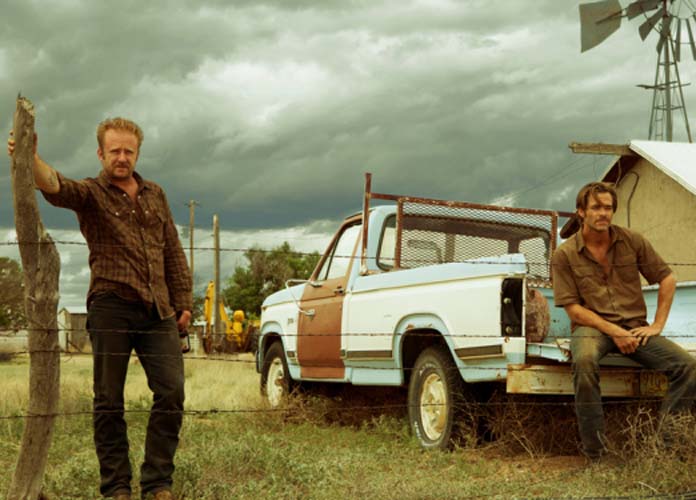

Hell or High Water Film
In the opening shot of Hell Or High-Water, the newest film from realist director David Mackenzie, a languidly turning camera pans across a dusty, pastel-colored parking lot of a West Texas bank, setting the stage for a robbery. As an old blue car sweeps in, the camera passes some quickly scrawled graffiti on the bank exterior, an angry reference to the big bank bailouts of 2008. Before the gun is put against the bank teller’s head on this early morning, the inscription sets up more than just a classic heist film. Well, at least on the part of the robbers.
Hell Or High-Water stars Chris Pine as Toby, the smart, level-headed robber to his brother Tanner’s ex-con violence (played one part maniac, two parts smart alack by Ben Foster). Together, they systematically set out on a mission to raid the various branches of Texas Midlands Bank, in an attempt to raise enough money to stop the foreclosure on their family land. A reluctant and overly polite criminal, Toby consistently chastises Ben about leaving as little destruction and upheaval as possible. This involves robbing small bills, forcing multiple robberies and turning their heist into a pseudo-road movie, as they pass from bank-to-bank across the derelict homes of a state in economic drought nearly ten years after the mortgage crisis. The original soundtrack complements the dusty, weather-worn landscape, and from sound-to-screen the film creates a full picture of a Texas in decline.
Mackenzie frequently and generously makes use of the vast expanses of the Texan plains (by way of New Mexico), pitting their numerous escape vehicles against the merciless, unending, and startlingly empty world around them. The filmmakers manage to bring this emptiness into smaller spaces as well, and even when the brothers sit and eat breakfast in a diner, the empty space stays. Toby emerges as a man desperate to end the cycle of poverty, using the wrong means to provide his sons with a secure life, while Tanner simply comes along for the ride. Foster consistently steals the show from Pine, who is relegated to the straight man position, while his co-star charms hotel staff and cracks jokes; these antics only serve to further contrast the growing monster inside Tanner, whose violent nature only escalates towards a destructive and borderline sociopathic finish.
Meanwhile, Texas Rangers Marcus and Alberto, played by Jeff Bridges and Gil Birmingham, respectively, are on their tails. The film’s funniest moments rest in the exchanges between the soon-to-be-retired Marcus and his partner, whom he jokingly berates non-stop, his Native American and Mexican heritage insult-fuel. In another world, they would be the perfect odd-couple comedy duo, but here, the jokes are cut with harsh reality. In a diner shortly after Toby and Tanner rob another bank, and Toby leaves the waitress a two-hundred dollar tip, Marcus attempts to retrieve the money for evidence. The waitress refuses, not out of greed, but out of desperation: she needs the money to pay off her mortgage.
While at The Comanche 66 Casino, Tanner gets into a heated conversation with a fellow player. A Comanche Native American. Tanner refers to his tribe as ‘The Lord of the Land.’ The moniker is ironically mocking and speaks to a more ancient commodity of power and status. In a compellingly-delivered monologue, Alberto also relates the transition of ownership Native America land over to the white Europeans, who are now forced to relegating that same claimed power to the banks. Land becomes the necessary key to break the multi-generational cycle of poverty—there’s oil on the brothers’ property—and yet the banks has seized it; an ironic truth to the sprawling, brown vistas, which are empty and yet truly belong to no one. This haunting cycle of greed undercuts the dark comedy of the film, which consistently points to the struggle everyday people must face in a economy that has abandoned them alone at the desert’s fringes. It’s all very Texan, and one can’t help but draw parallels to James Dean’s final performance in Giant, a 1950’s ode to Texas oil and the power of owning even the smallest patch of Earth.
Mackenzie’s film, which was penned by Sicario screenwriter Taylor Sheridan, is a race-against-the-clock-thriller; the brothers must turn over a trust created with the stolen money to the bank , after first converting it to chips at a casino so as to be untraceable (I am not totally convinced that this is plausible), in order to stop the foreclosure. However, the film doesn’t seem to place it’s biggest stake in whether or not they achieve this goal, but rather in what they must do to get there and how they even became this desperate in the first place, a scarily more relatable truth than you’d like to imagine. Be prepared for brutal and quick surprises, because no one is safe. Like Sicario, the film is unforgiving, to both audience and character, and its sense of justice skews in favor of the protagonist “bad-guys.” But, the brothers eventually cross a line in their pursuit of personal redemption, and once they do, there’s no going back.
Stewart told Fox News following her first arrest, "I look like a basic white girl,…
Prince Harry has been criticized for his "racist" approach to his African charities. In his…
Ajufo reflected, "There are a lot of things I’ll take away…the experience has been wonderful…
Kristi Noem, the Department of Homeland Security secretary, is being criticized on social media for…
Comedian Rosie O'Donnell explained that she left for Ireland because President Donald Trump has had…
Michael Jackson wasn’t just content with being the “King of Pop.” He wanted to be…